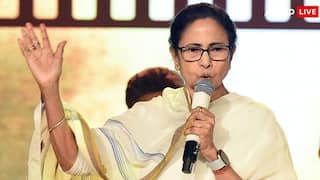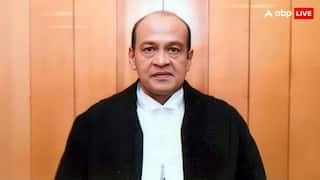'India Important Partner In Indo-Pacific Region, On Track To Be 3rd Largest Economy': Full Transcript Of Rishi Sunak Interview
In an interview to PTI, UK PM Rishi Sunak said his country will work closely with India during its presidency of the G20 to address the biggest challenges the world is facing.

Following is the transcript of PTI's exclusive interview with British Prime Minister Rishi Sunak over email.
Q: The ties between India and the UK have been on a major upswing. How do you see the overall trajectory of ongoing and likely future cooperation, especially in areas of defence, trade and critical technologies, in the backdrop of the current geopolitical upheaval, largely triggered by the Ukraine war?
A: The relationship between the UK and India will define the future of our two countries, even more than it is defining the present. Recognising the close links and aligned interests of our countries, two years ago we agreed the '2030 Roadmap' which was an historic commitment to bring our countries, economies and people closer together.
We have already achieved so much under this roadmap, including the mutual recognition of higher education qualifications, new visa routes for young professionals, and billions in new investment deals including British firms like Tesco, Deliveroo and Revolut establishing or expanding their presence in India, creating thousands of new jobs.
The UK Navy, Army and Air Force have all carried out exercises with their Indian counterparts, increasing our ability to work together to tackle shared threats.
As science and technology superpowers, shared UK-India expertise is pushing the boundaries of innovation for global good. Together, we delivered a COVID-19 vaccine; researched at Oxford University with UK Government financial support, developed by Astra Zeneca, and manufactured at scale by India's Serum Institute. From preventing pandemics to unravelling the human genome the UK and India are working together to tackle the challenges of tomorrow, today.
And, of course, we hope to go further still, including by finalising the first Free Trade Agreement India has ever agreed with a European country. I remain confident that we can strike a deal which benefits both the UK and India.
Our trade relationship is already worth INR 3.5 lakh crore a year - I want that number to be even higher. Every bit of trade between our countries represents new jobs, more choice for consumers and a stronger link between the British and Indian people.
Because what makes the UK-India relationship truly unique is the Living Bridge between our countries which includes a 1.6 million-strong Indian diaspora in the UK, and which connects our people across culture, education, food, sport and more.
As two major world democracies, our people define and drive us. That is why the UK is focused on supporting Ukraine to defend itself and defeat this illegal and unprovoked Russian invasion.
As a free and democratic country, Ukraine has the right to determine its own future. If Putin is allowed to invade a sovereign neighbour with impunity it will have terrible consequences for the entire world. Nobody wants peace more than the Ukrainians, but it is Putin who has the power to end this war tomorrow by withdrawing his troops.
Until he does, we will help the vulnerable in Ukraine and around the world deal with the terrible consequences of Putin's war, including the spike in the global price of food and energy caused by his manipulation of markets and attacks on grain supplies.
We will also work closely with India through their Presidency of the G20 to address the biggest challenges the world is facing, from stabilising the global economy to dealing with climate change.
Q: The UK Government's 'Integrated review of security, defence, development and foreign policy' included a 'tilt' to the Indo-Pacific and called for transforming cooperation with India "across the full range of our shared interests". The two sides also adopted an ambitious Roadmap 2030. Are the two sides looking at increasing the pace of the UK-India strategic ties including in the Indo-Pacific, a region that has witnessed China's increasing assertiveness? Is the UK also open to sharing critical defence technologies with India for co-development of military platforms?
A: The UK's foreign policy strategy, published in 2021, underlined the strategic importance of the Indo-Pacific region to the UK and the world. That's something we have confirmed this year when we published a refreshed version of the policy - our commitment to the Indo-Pacific isn't going anywhere, just as this region isn't going anywhere.
That is why we are investing more and more in our international relationships here, from becoming Dialogue Partners with ASEAN to membership of the CPTPP.
India is already on track to be the third largest economy in the world within ten years. That is why India is such an important partner in this region and more generally.
I absolutely see more for the UK and India to do together in the Indo-Pacific, building on the impressive cooperation that has already taken place across trade, defence and security under the 2030 Roadmap.
Q: There have been increasing concerns in India about activities of pro-Khalistani elements in the UK, especially after an attack on the Indian High Commission in London in March. There is a view in Delhi that the Khalistani issue is a stumbling block in deeper India-UK ties. How do you see it?
A: No form of extremism is acceptable in the UK, and I take the duty of the government to disrupt and counter violent, divisive ideologies, whatever they may be, very seriously.
We are working closely with our partners in the Indian Government to tackle the threat from Pro-Khalistan Extremism and the British police are fully empowered to deal with violent acts.
In August, the UK's Security Minister met Minister Jaishankar in New Delhi to develop our shared work addressing the threat of extremism and corruption. During that visit he announced new funding to enhance the UK's capability to tackle pro-Khalistan extremism. The INR 1 crore investment will strengthen our understanding of the threat posed by Pro-Khalistan Extremism and complement the joint work already underway between the UK and India.
UK citizens enjoy the right to gather lawfully and demonstrate a point of view, but rights to lawful protest do not extend to violent or threatening behaviour.
(This report has been published as part of the auto-generated syndicate wire feed. Apart from the headline, no editing has been done in the copy by ABP Live.)
Related Video
India@2047 Summit: Modi Calls for Innovation, Reforms, and National Resolve





































